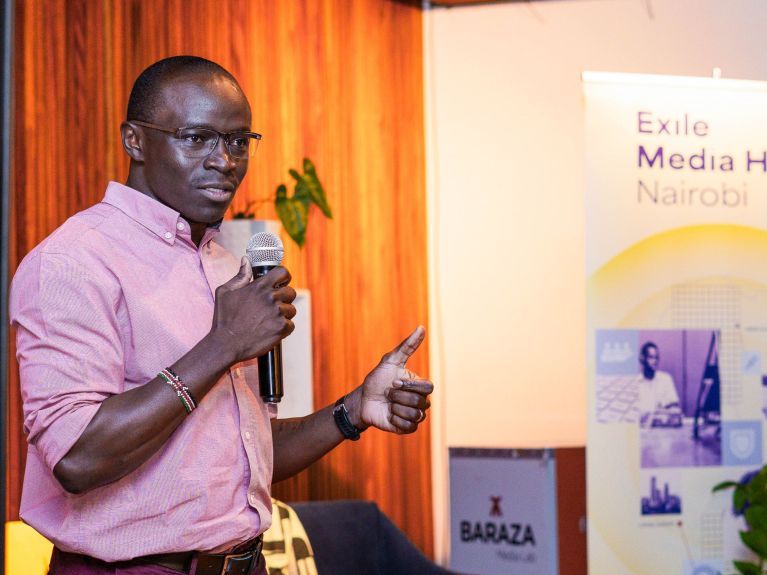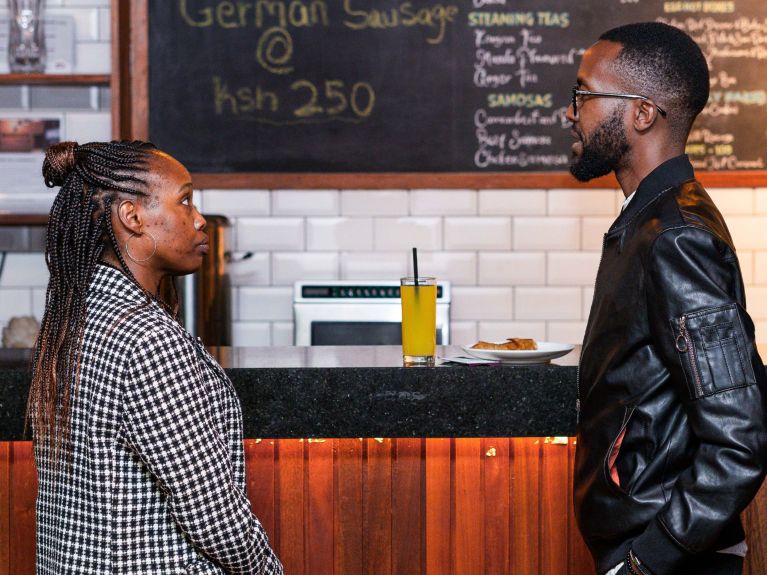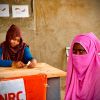So that critical voices are not silenced
War has been raging in Sudan since April 2023. The Exile Media Hub Nairobi supports journalists who are not safe in their home country.

The bullet hit Faiz Abubakr in the back. This is what he says in a YouTube video posted by the German non-profit organisation Media in Cooperation and Transition (MiCT) at the beginning of 2024. Abubakr shows his scar in the video, saying that he was taking photos when he was captured by soldiers of Rapid Support Forces (RSF) and one of them shot him. When Abubakr told them he was a photojournalist, they let him go. Shortly afterwards he left Sudan and fled to Egypt.
Dieses YouTube-Video kann in einem neuen Tab abgespielt werden
YouTube öffnenThird party content
We use YouTube to embed content that may collect data about your activity. Please review the details and accept the service to see this content.
Open consent formCivil war has been raging in Abubakr’s home country since April 2023. Two generals are fighting to take over control of the country. On the one hand the President, Abdel Fattah al-Burhan, with the Sudanese Armed Forces (SAF), and on the other his former deputy Mohammed Hamdan Daglo, leader of the RSF militia. The violence is causing huge suffering among the population. Thousands have died, millions of people have fled. The United Nations warns of genocide, while the World Health Organisation (WHO) sees an acute danger of famine.
Journalists have fled from Sudan
The world does not hear much about this war. Reporting from the country is dangerous and difficult. Like Faiz Abubakr, many journalists have fled to Egypt, Saudi Arabia, Uganda or Kenya. For some time now, there has been a contact point for them there which also serves exiled journalists from other East African countries: the Exile Media Hub Nairobi. “The Hub was opened in response to the escalation of the conflict in Sudan,” says Jey Wegner, who runs the fellowship programme at MiCT.
Financial aid for journalists in exile
Run by MiCT, the International Press Association of East Africa (IPAEA) and the Sudanese organisation Al Adwaa, the Hub was officially opened in April 2024 with the support of UNESCO and the German Foreign Office under the Hannah Arendt Initiative. There was a pilot phase the year before in which 80 journalists received funding, including Faiz Abubakr. In 2024, around 35 more fellows from East Africa are to be added who can apply to receive support for a few months. This includes a scholarship and other assistance programmes.

The Hub has been set up on the premises of the Baraza Media Lab in Nairobi. It is intended as a refuge for East African journalists in exile – and seeks to empower them to continue working. Here they can find a co-working space, a podcast studio, and equipment they can borrow for their work. But the Hub not only offers structures on site, it also exists as a digital contact point for those who are not in Nairobi.
Advice on security, visas, language courses
IPAEA staff supervise the fellows in coordination with MiCT. They also offer advice on security issues, visas and language courses, thereby helping with integration. Mental health is also an issue that is addressed through individual counselling or group sessions. The refugees have often experienced terrible things. “It’s important to have a community in exile where you can share your experiences,” says Wegner. Journalists from East Africa are not the only ones who can engage with others here. Through the “MiCT Fellowship for Critical Voices” there are hundreds of fellows around the world.

The Hub in Nairobi also offers further training opportunities and supports the fellows in finding paths and networks in the media scene that will enable them continue to finance their work in the future. “You remain a fellow for life,” says Wegner, even after the fellowship has been paid out, adding that reporting is “incredibly important to refugee journalists”. Wegner tells of a journalist in Uganda, for instance: she produces an Arabic radio programme for her compatriots who have also fled Sudan so they know what is happening in their home country. “They’re highly impressive personalities,” says Wegner of the fellows. “You can’t imagine how much resilience these people have.“

Faiz Abubakr is now back in Sudan. He answers a few questions via WhatsApp despite the poor signal. The Hub has helped him work a little and earn a living, he says. But as he adds: “I’m passionate about documenting current events in Sudan at this difficult time.” The war is currently putting obstacles in the way of this passion. Abubakr received the World Press Photo Award in the “Africa, Singles” category in 2022; Agence France Press, the New York Times and Le Monde were among his clients, he says. But when asked about his current job situation, he says: “There’s nothing at the moment. I’ve lost everything.” On his Instagram account, with 10,000 followers, his photos give you an up-to-date impression of his home country. People on the run, destroyed houses. But Faiz Abubakr doesn’t allow himself to be deprived of his photography – or his hope: “I hope peace will prevail and this war will end.”



